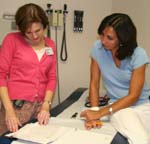Clinic provides specialty care for
adoptees
by Cindy
AbolePublic Relations
The foundation of family dynamics is constantly changing. In the United States, the number of international adoptions in the last few decades has tripled to about 20,000 adoptions per year.
With more American families adopting overseas, the need for sound, quality health care grows.
In the past few years, MUSC has catered to this community through a weekly specialty clinic that’s gaining attention and receiving praise from adoptive parents, health professionals, family and adoption advocates, and a growing number of practitioners who provide adoption medicine.
 Dr. Andrea Summer,
left, reviews a chart with Dr. Angela LaRosa.
Dr. Andrea Summer,
left, reviews a chart with Dr. Angela LaRosa.The MUSC International Adoption Clinic (IAC) was created in 2004 by Andrea Summer, M.D., and Angela LaRosa, M.D., as a way to provide for the health, developmental and behavioral needs of internationally adopted children. The program accomplishes this by providing clinical services, collaborative research and patient/family education.
“People are adopting children on an international scale now more than ever before,” said Summer, assistant professor of pediatrics. “This growth affects the need for more trained physicians and services in adoption medicine and international health to help meet and anticipate their needs.”
Created under the Department of Pediatrics, the clinic provides a variety of services for adoptive families, including pre-adoption consults, post-adoption medical and developmental evaluations, plus follow-up care for children with special needs.
The clinic is the only one of its kind in the state offering developmental and infectious disease services, and is patterned after the nation’s most established International Adoption Clinic at the University of Minnesota in Minneapolis.
The IAC treats an average of 100 patients per year that Summer and LaRosa see. The clinic is organized to evaluate children shortly after they have arrived in the United States and regularly thereafter, as needed.
A child’s initial evaluation visit may take up to two hours. This allows the team to review medical records, obtain a thorough medical history, screen for infectious disease, and complete a developmental and behavioral assessment. Each patient is unique, and health and developmental issues inherent to his global environment are taken into consideration. The patient is then scheduled for a six-month follow-up visit. To meet specific and often complex needs of these children, the IAC provides referral coordination services to other pediatric sub-specialists and therapists.
“There are times when practitioners at private and urgent care clinics may not know why an adoptive child is sick, but the child may have just come from an area of the world where there’s a high incidence of malaria or other tropical diseases,” Summer said. “That’s why it’s important to educate providers, clinicians and families as well as the general public about what we provide.”
As part of its services, the clinic introduced a database system to follow a patient’s long-term outcome. Findings- to-date suggest that children adopted internationally are at an increased risk for long-term developmental and neurobehavioral disorders. The information collected will provide a sound statistical perspective to address these concerns, said LaRosa, a developmental pediatrician and co-director of the clinic. LaRosa works closely with psychologists, speech and language therapists and area school districts to help diagnose and manage developmental language, learning, emotional and behavioral disorders. “We’re working with a unique population in which there is limited experience and research in this field,” she said.
Internationally adopted children are exposed to inordinate change, according to LaRosa. They are adjusting to challenges, from everyday life in a new country to learning to speak a new language. LaRosa sees patients who’ve learned to adjust and can converse well in English, but still struggle with academic language proficiency, which places them at risk for academic struggles in the school system. These children typically receive English to Speakers of Other Languages (ESOL) services in the school system for additional services. To address academic problems LaRosa works with colleagues to conduct language proficiency tests with new IAC patients to determine their English language proficiency. Some challenges are attributed to a child still struggling through adjustment and other related issues. LaRosa is cautious about diagnosing an IAC patient with a learning disability unless language proficiency is established.
Unfortunately some children adopted from international orphanages have a history of maltreatment, abuse and neglect, and may not have received good health care. Each child comes with different risk factors and different problems, LaRosa said. Despite this, both Summer and LaRosa have enjoyed success they see in the children treated in their clinic.
To help understand these children, the clinic collaborates with specialists like pediatrician and psychiatrist Eve Spratt, M.D., associate professor of pediatrics. Spratt received federal research funding to assess how the stress of abuse, neglect and maltreatment affects children’s brain development, neuro-endocrine system, and subsequent cognitive and emotional functioning.
“It’s great to see changes, especially when children are healthy, adjusted and thriving in a healthy home environment,” Summer said. “It’s something we love to see with children as they grow.”
For information about the adoption clinic, call 876-8512 or visit http://www.musckids.com/about/dept_prog/adoption.htm.
Friday, Aug. 25, 2006
Catalyst Online is published weekly,
updated
as needed and improved from time to time by the MUSC Office of Public
Relations
for the faculty, employees and students of the Medical University of
South
Carolina. Catalyst Online editor, Kim Draughn, can be reached at
792-4107
or by email, catalyst@musc.edu. Editorial copy can be submitted to
Catalyst
Online and to The Catalyst in print by fax, 792-6723, or by email to
catalyst@musc.edu. To place an ad in The Catalyst hardcopy, call Island
Publications at 849-1778, ext. 201.